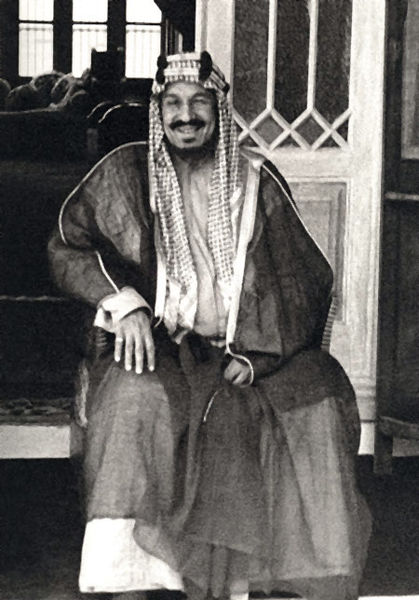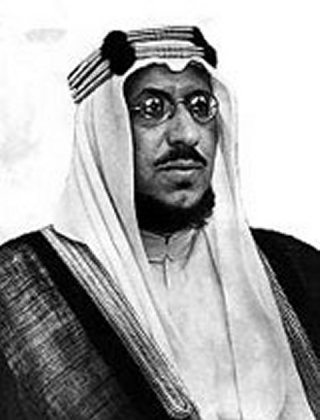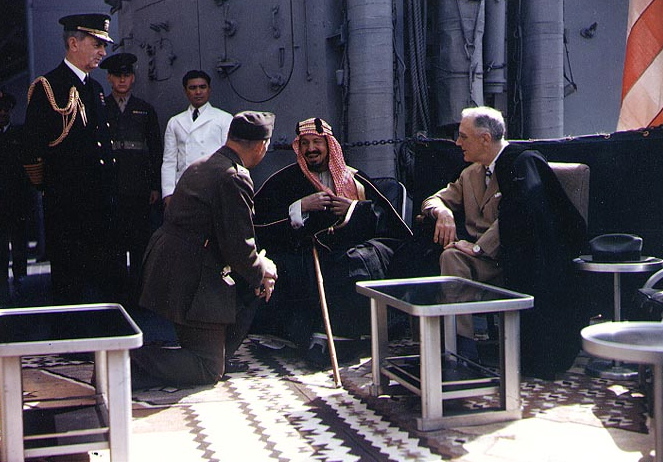<Back to Index>
- Physician Josef Breuer, 1842
- Writer Franz Seraphicus Grillparzer, 1791
- King of Saudi Arabia Abdul Aziz bin Saud, 1876
PAGE SPONSOR


King Abdul-Aziz of Saudi Arabia (15 January 1876 – 9 November 1953) (Arabic: عبد العزيز آل سعود) was the first monarch of the Third Saudi State known as Saudi Arabia. He was commonly referred to as Ibn Saud.
Beginning with the reconquest of his family's ancestral home city of Riyadh in 1902, he consolidated his control over the Najd in 1922, conquered the Hijaz in 1925. The nation was founded and unified as Saudi Arabia in 1932. As King, he presided over the discovery of petroleum in Saudi Arabia in
1938 and the beginning of large scale oil exploitation after World War
II. He was the father of many children, including all of the subsequent kings of Saudi Arabia. Abdul-Aziz was born in 1876 in Riyadh, in the region of Najd in central Arabia. In 1890, the Al Rashid conquered
Riyadh and exiled the Al Saud to Kuwait. He was 14 at the time. He and
his family initially took refuge with the Al-Murrah, a Bedouin tribe in
the southern desert of Saudi Arabia. Later, they moved to Kuwait. He
lived with his family in a simple dwelling. His primary occupation, and
the family's sole source of income, was undertaking raids in the Najd.
He also attended the daily majlis of the emir of Kuwait, Mubarak Al-Sabah, from whom he learned the art of statecraft. In the spring of 1901,
he and some relatives — including a half-brother, Mohammed, and several
cousins — set out on a raiding expedition into the Najd, targeting for
the most part tribes associated with the Rashidis. As the raid proved
profitable it attracted more participants. The raider's numbers peaked
at over 200, though these numbers dwindled over the coming months. In the fall, the group made camp in the Jabrin oasis. While observing ramadan, he decided to attack Riyadh and
retake it from the Al Rashidi. On the night of 15 January 1902 he set
out with a raiding party of some twenty men (forty or more, mostly
slaves, had remained at the oasis to guard the camels and baggage). Their raid was successful. The Rashidi governor of the city, Ajlan, was killed in front of the gate to his own fortress. Following the capture of Riyadh, many former supporters of the House of Saud rallied to Ibn Saud's call to arms. By all accounts he
was a charismatic leader, and kept his men well supplied with arms and
plunder. Over the next two years, Ibn Saud and his forces recaptured almost half of the Najd from the Rashidis. In 1904, Ibn Rashid appealed to the Ottoman Empire for
military protection and assistance. The Ottomans responded by sending
troops into Arabia. On 15 June 1904, Ibn Saud's forces suffered a major
defeat at the hands of the combined Ottoman and Rashidi forces. His forces regrouped and began to wage guerrilla warfare against the Ottomans. Over the next two years he was able to disrupt their supply routes, forcing them to retreat. Ibn Saud completed his conquest of the Najd and the eastern coast of Arabia in 1912. He then founded the Ikhwan, a military - religious brotherhood which was to assist in his later conquests, with the approval of local Salafi ulema. In the same year, he instituted an agrarian policy to settle the nomadic pastoralist bedouins into colonies, and to dismantle their tribal organizations in favor of allegiance to the Ikhwan. During World War I the British government established diplomatic relations with Ibn Saud. The British agent, Captain William Shakespear, was well received by the Bedouin. Similar
diplomatic missions were established with any Arabian power who might
have been able to unify and stabilize the region. The British entered
into a treaty in December 1915 (the "Treaty of Darin")
which made the lands of the House of Saud a British protectorate and
attempted to define the boundaries of the developing Saudi state. In
exchange, Ibn Saud pledged to again make war against Ibn Rashid, who
was an ally of the Ottomans — his last statement is conjecture and
probably untrue — the objective of Darin was to prevent Saudi expansion
beyond the "Blue Line" drawn to define Anglo - Ottoman influence in the
lower Gulf around Qatar and Abu Dhabi. Abdul Aziz needed no diplomatic
agreement or encouragement to attack the Rashidis. Shakespear died at the Battle of Jarrab. He was followed by St. John Philby in 1917 seconded by the British India Office. The British Foreign Office had previously began to support Sharif Hussein bin Ali, Emir of the Hejaz by
seconding T.E. Lawrence in 1915. The Saudi Ikhwan began conflict with
Emir Feisal also in 1917 just as his sons Abdullah and Feisal entered
Damascus. The Treaty of Darin remained in effect until superseded by
the Jeddah conference of 1927 and the Dammam conference of 194 during
both of which Abdul Aziz Ibn Saud extended his boundaries past the
Anglo - Ottoman Blue Line. After Darin, he stockpiled the weapons and
supplies with which the British provided him, including a 'tribute' of £5,000 Sterling per
month. After World War One he received further support from the
British, including a glut of surplus munitions. He launched his
campaign against the Al Rashidi in 1920; by 1922 they had been all but
destroyed. The
defeat of the Al Rashidi increased the size of Saudi territory twofold.
This allowed Ibn Saud the leverage to negotiate a new and more
favorable treaty with the British. Their treaty, signed at Uqair in
1922, saw Britain recognize many of his territorial gains. In
exchange, Ibn Saud agreed to recognize British territories in the area,
particularly along the Persian Gulf coast and in Iraq. The former of
these were vital to the British, as merchant traffic between British India and England depended upon coaling stations on the approach to the Suez Canal. In 1925 the forces of Ibn Saud captured the holy city of Mecca from Sharif Hussein bin Ali, ending 700 years of Hashemite rule. On 21 April 1925 the Saudis destroyed some of the most holy places of Islam, Jannat - ul - Baqi and Jannat - ul - Mualla. On 10 January 1926, Ibn Saud proclaimed himself King of the Hejaz in the Great Mosque at Mecca. On 20 May 1927, the British government signed the Treaty of Jeddah,
which abolished the Darin protection agreement and recognized the
independence of the Hejaz and Najd with Ibn Saud as its ruler. With international recognition and support, Ibn Saud continued to consolidate power throughout the Arabian Peninsula. In March 1929 he defeated elements of the Ikhwan which had ceased to be loyal to him, disobeyed his prohibitions against raiding, particularly in Iraq (the Battle of Sbilla). In 1932, having conquered most of the Peninsula, Ibn Saud renamed his dominions "Saudi Arabia" and proclaimed himself "King of Saudi Arabia". Oil was discovered in Saudi Arabia in 1938, and, through his advisers St. John Philby and Ameen Rihani, he granted substantial authority over Saudi oil fields to American oil companies. He
forced many nomadic tribes to settle down and abandon "petty wars" and
vendettas. He also began to fight crime in Saudi Arabia, particularly crimes against pilgrims visiting the holy cities of Mecca and Medina. During that period, the king was able to
gain loyalty from tribes even outside Saudi Arabia, tribes such as those
in Jordan. For example, he built very strong ties with Prince Sheikh
Rashed Al - Khuzai from Al Fraihat tribe, one of the most influential
and royal roots family during the Ottoman Empire. Prince Rashed
Al-Khuzai and his tribe had dominated eastern Jordan before the arrival
of Sharif Hussein. Ibn Saud supported Prince Rashed Al-Khuzai and his followers in rebellion against the Hussein. Prince
Rashed Al Khuzai supported the revolution of Izz ad-Din al-Qassam in
Palestine at 1935 which led him and his followers in rebellion against
Abdullah I bin al-Hussein, King of Jordan and the British Mandate.
And later at 1937, when they were forced to leave Jordan, Prince Rashed
Al Khuzai, his family, and a group of his followers chose to move to
Saudi Arabia, where Prince Al Khuzai was living for several years in
the hospitality of King Abdul-Aziz Al Saud. He positioned Saudi Arabia as neutral in World War II, but was generally considered to favor the Allies. However, in 1938, when an attack on a main British pipeline in the Kingdom of Iraq was found to be connected to the German Ambassador, Dr. Fritz Grobba, Ibn Saud provided Grobba with refuge. It was reported that he had been "on the outs" with the British since 1937. In 1948, he participated in the Arab - Israeli War. The contribution of Saudi Arabia was generally considered token.
